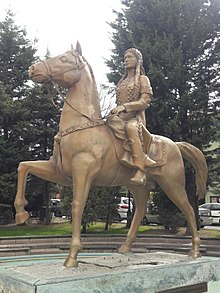Kameriye Malhun Hatun[3] ("moon" and "wealth"; also called Mal Hatun or Mala Hatun; died after 1326)[1] was the second legal wife of Osman I,[4][5] the leader of the Ottoman Turks and the founder of the dynasty that established and ruled the Ottoman Empire. She was the mother of Sultan Orhan.[1]
| Malhun Hatun | |||||
|---|---|---|---|---|---|
 | |||||
| Born | 13th century Anatolia | ||||
| Died | After 1326[1] Söğüt, Anatolia | ||||
| Spouse | Osman I | ||||
| Issue | Orhan[1] | ||||
| |||||
| Father | Abdülaziz Ömer Bey[2] | ||||
| Religion | Sunni Islam | ||||
Biography
According to some historians, she was the daughter of the Anatolian Turkish Bey, Ömer Bey.[2] In the past there have been many speculations that she was the daughter of Sheikh Edebali, as most of the historians during the Ottoman period accept that she was indeed his daughter, although her name has been a subject of conflict to this date, but now it is known that Edebali's daughter was Rabia Bala. Other sources say that she was the daughter of Ömer Abdülaziz Bey, Seljuk Vizier of Anatolia.[6][better source needed][1]
The 1324 endowment deed for a Dervish Monastery built by Sultan Orhan suggests that his mother was not, as popular historical tradition maintains, Edebali's daughter but rather Mal Hatun, the daughter of one "Umar Bey or Ömer Bey". The title "Bey", used by the princely dynasties of Anatolia, suggests that Mal Hatun's father was a person of some status and authority. One possibility is that he was the eponymous ruler of an "Amouri" (Umeri) Principality, which was located northeast of the emerging Ottoman State and disappeared in the late 13th or the early 14th century.[citation needed]
The Amouri are described by the 13th century Byzantine historian George Pachymeres, who says that a son of Umar fought with Osman in one of his first raids against local Byzantine lords (the victory of Baphaion). The Ottomans, according to Pachymeres, went on to assume the role played by Amouri until their demise as the principal aggressor against the Byzantines in the northwest Anatolia. If Pachymeres's report is correct, the timing and the political context are appropriate for a marriage between Osman and Umar Bey's daughter.[7]
In popular culture
- In the Turkish historical dramma series Kuruluş Osman, Malhun Hatun is portrayed by the Turkish actress Yıldız Çağrı Atiksoy.[8]
See also
Further reading
- Peirce, Leslie P., The Imperial Harem: Women and Sovereignty in the Ottoman Empire, Oxford University Press, 1993, ISBN 0-19-508677-5 (paperback).
- Bahadıroğlu, Yavuz, Resimli Osmanlı Tarihi, Nesil Yayınları (Ottoman History with Illustrations, Nesil Publications), 15th Ed., 2009, ISBN 978-975-269-299-2 (Hardcover).
References
- ^ a b c d e Emecen, Feridun (2019). "Mal Hatun". TDV Encyclopedia of Islam (3rd ed.) (in Turkish). Vol. Annex 2. pp. 182–183.
- ^ a b Sakaoğlu, Necdet [in Turkish] (2008). Bu mülkün kadın sultanları: Vâlide sultanlar, hâtunlar, hasekiler, kadınefendiler, sultanefendiler. Oğlak Publications. p. 29. ISBN 978-9-753-29623-6..
- ^ Sakaoğlu, Necdet (2008). Bu mülkün kadın sultanları: vâlide sultanlar, hâtunlar, hasekiler, kadınefendiler, sultanefendiler (in Turkish). Oğlak Yayıncılık. p. 29. ISBN 978-975-329-623-6.
- ^ "Osman Bey Malhunla Ne Zaman Evlendi? Osman Bey Malhun Hatun İle Nasıl Tanıştı?". mardinlife.com (in Turkish). 23 February 2021. Retrieved 7 May 2021.
- ^ Akram, Uzair. "Real History of Bala Hatun in Kurulus Osman Season". historicales.com. Archived from the original on 12 May 2021. Retrieved 7 May 2021.
{{cite web}}: CS1 maint: unfit URL (link) - ^ "Consorts Of Ottoman Sultans (in Turkish)". Ottoman Web Page.
- ^ Leslie P., Peirce (1993). "Wives and Concubines: Toward Concubinage". The Imperial Harem: Women and Sovereignty in the Ottoman Empire. New York: Oxford University Press. pp. 55. ISBN 978-0-19-508677-5.
- ^ "Kuruluş Osman'ın Malhun Hatun'u Yıldız Çağrı Atiksoy'un son hali çok konuşuldu! Yeni imajı olay oldu". Halk TV (in Turkish). 2023-06-22. Retrieved 2023-06-27.